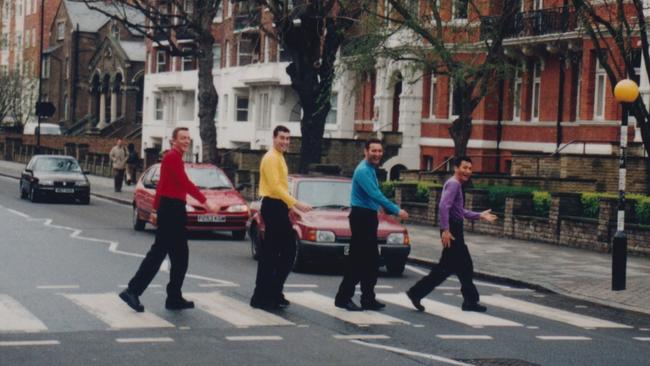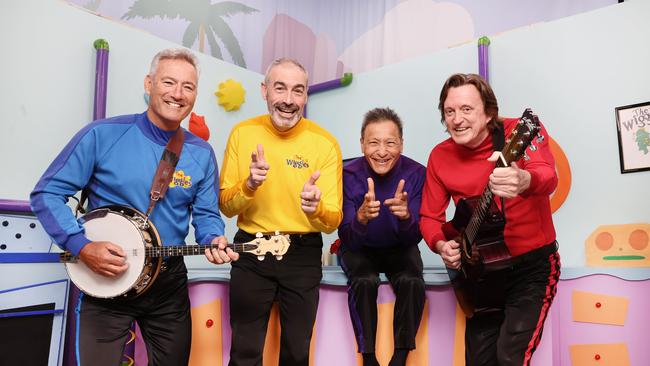The Wiggles: how men in skivvies built an empire
While the target audience is children, adults are fans too. Spotting Robert De Niro in the audience, munching on popcorn, made the childlike Australians on stage think of the film Cape Fear.

“This wasn’t something that was invented in a boardroom. It was four mates who did a record and they thought that was all it was going to be.”
That’s not one of the Beatles. It’s one of the Wiggles, the red-skivvy-clad Murray Cook, remembering the 1991 origin of the Australian children’s music group that, like the Fab Four, topped the charts and made millions.
In 2005, for example, the Wiggles were No.1 on BRW magazine’s rich list of Australian entertainers, earning $50m, more than AC/DC, Nicole Kidman or Hugh Jackman. All for singing songs about potatoes, fruit salad, a big red car and how to dance like a monkey, usually with a friendly green dinosaur named Dorothy grooving to the tune.
The 90-minute documentary Hot Potato: The Story of the Wiggles is written and directed by Sally Aitken, who received an International Emmy nomination in 2018 for her film about my friend and colleague, David Stratton: A Cinematic Life.
She interviews the four original Wiggles – Cook, Anthony Field, Greg Page and Jeff Fatt – and the newer members of the group, which has diversified in terms of gender and race, and has access to their archive of photographs and videos.

The result is a straightforward account of how four young men who met at Sydney’s Macquarie University, where they were studying early childhood teaching, formed a band that went from playing at preschools to selling out Madison Square Garden in New York City. Not everyone predicted it, which is no surprise.
When the Wiggles first approached the ABC about doing a television show, they were told “lose the dinosaur”. Dorothy, unlike her real counterparts, fended off extinction and remains with the group.
Along the way to the top there were ups and downs, as happens with any band, including the Beatles, whom the Wiggles have parodied at times, including by doing the Abbey Road crossing. Field, the only founding member still in the group, talks about his depression.
Page discusses his departure from the group due to health problems and his return five years later, which caused internal squabbles and a public backlash.
While the target audience is children, adults are fans too. Spotting Robert De Niro in the audience, munching on popcorn, made the childlike Australians on stage think of the film Cape Fear.
The funniest moment is John Travolta doing a rendition of the song after which this movie is named: Hot Potato. The saddest is the wife of a firefighter who died in 9/11 talking about the time she and their baby son spent backstage with the Wiggles after a concert in New York.
“The Wiggles brought in this light,” she says, with tears in her eyes. For all the money the Wiggles have made, there’s a feeling that this personal touch, and seeing the joy of children, is what matters most to them.
This movie is an entertaining introduction to an unlikely Australian success story. For older Wiggles fans it’s a backstage pass to see how it all happened. For present fans there’s enough of Dorothy and Captain Feathersword and hot potatoes and the other hit songs to make up for the boring bits where adults are just talking.




To join the conversation, please log in. Don't have an account? Register
Join the conversation, you are commenting as Logout